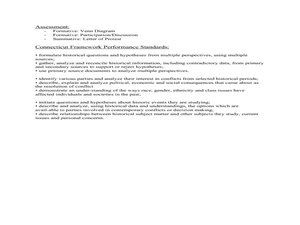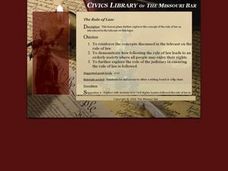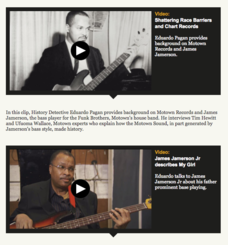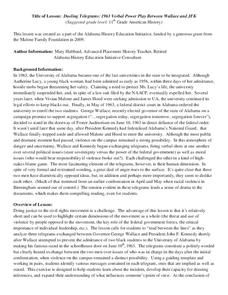Curated OER
The Civil Rights Movement in Kentucky
Eleventh graders examine how current race relations in their town compare to those of the 1960's.
Curated OER
Martin Luther King, Jr. vs. Malcolm X
Eleventh graders compare and contrast the visions of Martin Luther King, Jr. and Malcolm X. In this African-American history lesson, 11th graders read speeches by each of the men and summarize the arguments made by each of them about...
Curated OER
Social Life in the 1950's and Domestic Politics and Policy
Eleventh graders examine the cultural mood and politics of the 1950's in the United States. They read a section of their text and take notes, view a clip of the movie "Pleasantville" and discuss societal roles in the 1950's, and listen...
Curated OER
Celebrating 100 Years of Negro Leagues Baseball
Ninth graders locate original locations of Negro Leagues Baseball teams using latitude and longitude, calculate distances between locations using maps and/or Internet resources, and use critical thinking skills to compare and contrast...
Curated OER
How Women Got the Vote: The Story of Carrie Lane Chapman Catt
Students participate in a simulation and compare and contrast the arguments for and against womens' right to vote. In this civil rights lesson, students simulate disenfranchisement of women by allowing only half of the class to vote on a...
Curated OER
Civics: The Rule of Law
Students examine key concepts pertaining to the rule of law. They explore how Civil Rights leaders such as Martin Luther King, Jr. used it to oppose discrimination practices. They examine Supreme Court decisions demonstrating the...
Curated OER
The Sixties Protests and Social Change
Students identify, examine and analyze photographs of the sixties to determine the forces of social change at work in America during this decade. They determine the goals of each movement and the methods used by each to achieve those goals.
Curated OER
Thoreau, Gandhi, and Martin Luther King, Jr.
Students explore the concept of non-violent resistance. In this political philosophies lesson, students study the political tactics of Mohandas Gandhi, Henry David Thoreau, and Martin Luther King, Jr. in order to discover how each of...
Curated OER
Discrimination and the Struggle for Equality: African Americans in Professional Baseball: A Reflection of the Civil Rights Movement
Students develop the ability to research individuals and summarize the basic information on that person's life. They design a logo and graphic setting for a particular set of cards and create a set of trading cards of Negro League...
National Endowment for the Humanities
Revolution '67, Lesson 1: Protest: Why and How
To some people, protesting is as American as apple pie, but the factors that lead to protests can be as confusing to veteran activists as to today's youth. Revolution '67 explores the riots in Newark, New Jersey as a case study. Using...
PBS
The Sixties: Hitsville USA
James Jamerson. You probably heard him but may not have heard of him. But fans of Motown Records will certainly recognize his contributions to the sound that desegregated popular music during the 1960s. Challenge young history detectives...
National Endowment for the Humanities
Revolution '67, Lesson 2: What Happened in July 1967? How Do We Know?
Even in a world in which dozens of participants and curious onlookers record every controversial event, the basic facts of what happened are often in dispute. Revolution '67, Lesson 2 explores 1967 Newark, New Jersey using an examination...
Stanford University
Beyond Vietnam
On April 4, 1967 Martin Luther King, Jr. delivered his speech "Beyond Vietnam." The controversy that followed is the focus of a three-lesson unit that asks class members to consider the political and social implications of King's stance.
Roy Rosenzweig Center for History and New Media
Rosa Parks and the Montgomery Bus Boycott
Participants examine two documents related to Rosa Parks and the bus boycott, sources that challenge some of the commonly held preconceptions about Rosa Parks. They then respond to discussion questions to reinforce understanding and...
Center for History and New Media
The Impact of the Jim Crow Era on Education, 1877–1930s
Even though American slaves were officially emancipated in 1865, the effects of slavery perpetuated throughout the 19th and 20th centuries. Middle and high schoolers learn about the ways that discrimination and the Jim Crow laws...
Curated OER
Thurgood Marshall Makes a Difference
Students find information about the life and legal career of Thurgood Marshall, including the NAACP and its causes. They comprehend the issues and context of the Brown v. Board of Education case that Marshall argued before the U.S....
Curated OER
From Jim Crow To Linda Brown: A Retrospective of the African-American Experience from 1897 to 1953
Learners examine African American issue between the years 1897 and 1953. In this African American history lesson, students research the social, economic, and political conditions of African Americans during the aforementioned time span...
Curated OER
Breaking the Code: Actions and Songs of Protest
Students listen to and discuss the purpose of protest music. They analyze an editorial cartoon related to Jim Crow and read questions from the literacy tests given to African-Americans. They work together to write a song about the...
Curated OER
Equality: Are Some More Equal than Others?
Students research a person who has been active in supporting human rights around the world. They simulate an international conference and write a newsletter focused on human rights in a specific country.
Curated OER
American Civil War
Eighth graders read a collection of stories about the Civil War. Based upon their readings, they perform various activities to reinforce facts about the Civil War. Students create time lines, maps and reports about the war. They...
Alabama Department of Archives and History
Dueling Telegrams: 1963 Verbal Power Play Between Wallace and JFK
Information, inferences, and innuendos. Text and subtext. Class members examine telegrams exchanged between President John F. Kennedy and Alabama Governor George Wallace, studying both what is stated and what is implied by the diction...
Curated OER
Everybody Is Unique: A Lesson in Respect for Others' Differences
Learners of all ages talk about the meaning of the word "unique," and draw a truly unique person, one part at a time. They create a totally unique person, with a head drawn by one student, a torso drawn by another student, and lower body...
Curated OER
Inventors & Trailblazers
Students are introduced to a groups of African American inventors. In groups, they research the role of each person in improving different industries. They also examine the barriers African Americans faced from the Civil War to the...
Curated OER
Say It Loud!: A Celebration Of Black Music In America
Students examine the role music played in African American history and research events of the Civil Rights movement.

























